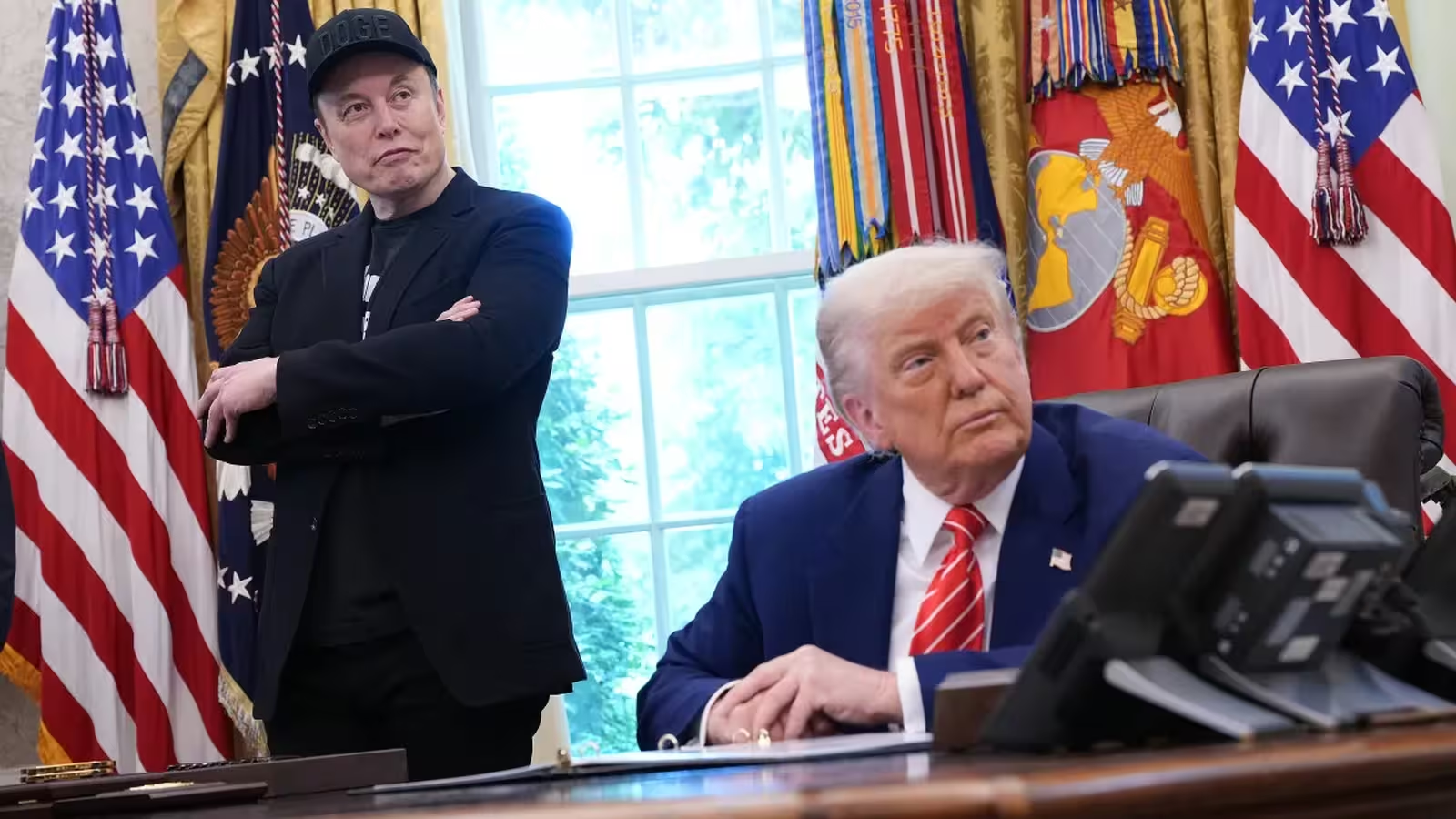6 Minutes
A High-Tech Rift: Elon Musk and Donald Trump Publicly Clash Online
The technology sector is witnessing an unprecedented feud between two of its most influential figures: President Donald Trump and Elon Musk, CEO of Tesla, SpaceX, and X (formerly Twitter). What was once a powerful political alliance has rapidly unraveled, now playing out for millions to witness on their respective social media platforms.
From Partners to Rivals: The Timeline of a Fallout
Elon Musk was long considered a trusted advisor within Trump’s circle, guiding several high-level decisions on innovation and government efficiency, particularly through his involvement with the now-infamous “Department of Government Efficiency.” Musk’s regular presence at the White House and Mar-a-Lago solidified his status as a key tech insider.
However, everything changed dramatically with the introduction of the sweeping “One Big Beautiful Bill Act.” Passed in the House on May 22, this 1,038-page legislative package aimed to drive tax cuts and stimulate American business—particularly in the tech and manufacturing sectors. Yet, the Congressional Budget Office estimates the bill would deepen the national debt by $2.4 trillion within ten years, while also slashing taxes by $3.7 trillion and raising the debt ceiling to unprecedented levels.
The Bill’s Impact: Pros, Cons, and Tech Industry Consequences
While the bill promised economic relief through tax cuts—removing taxes from Social Security income, tips, and overtime pay—it also authorized significant reductions in federal support for healthcare programs like Medicaid and SNAP. According to CBO estimates, these cuts could leave nearly 11 million additional Americans uninsured by 2034.
Tech companies were watching closely, as the legislation carried provisions that would make Trump’s Tax Cuts and Jobs Act permanent—a policy that, research shows, disproportionately benefits the wealthiest individuals. The bill’s newer tax relief measures are also poised to favor affluent families, with limited benefits for low-income workers.
In addition, the bill would restrict states’ abilities to regulate artificial intelligence over the next decade—a move that concerned both government watchdogs and tech leaders focused on AI policy. Rep. Marjorie Taylor Greene, who supported the bill despite not reading its entirety, later expressed regret, citing its AI implications.
The Social Media Showdown: Pointed Posts, Personal Attacks
The breakdown intensified when Trump rescinded Musk’s nomination of Jared Isaacman—Musk’s preferred pick to lead NASA. Soon after, the heated rhetoric spilled onto X (formerly Twitter) and Truth Social.
"This massive, outrageous, pork-filled Congressional spending bill is a disgusting abomination," Musk decried on X. He urged lawmakers who supported the legislation to reconsider their choices, calling attention to its long-term economic downsides and the impact on innovation funding.
Trump responded by suggesting Musk’s opposition was self-serving, stemming from planned rollbacks of electric vehicle (EV) subsidies—vital to Tesla’s business model. "He only developed a problem when he found out we’re going to cut the EV mandate. That’s billions and billions of dollars," Trump asserted.
The digital feud quickly escalated, with the two trading barbs regarding their financial contributions, influence on electoral outcomes, and technology policy priorities. Musk countered Trump’s narrative, stating, "Without me, Trump would have lost the election... Republicans would be outnumbered in the Senate."
Bigger Stakes: Product Features, Market Relevance, and Industry Implications
The EV Mandate and Autonomous Tech Debate
The core of the dispute turns on the future of EV mandates—federal policies that require and incentivize electric vehicle manufacturing. Tesla, as an industry leader, stands to gain significantly from such regulation. A reduction or elimination of EV quotas could deeply erode Tesla’s U.S. market advantage, challenge its growth trajectory, and hamper future R&D into cutting-edge AI-driven autonomous vehicles.
The SpaceX and NASA Nexus
SpaceX, another Musk-led company, has become a backbone of U.S. space infrastructure, from the Dragon spacecraft’s resupply missions to the International Space Station, to satellite internet deployment with Starlink. Trump’s threats to revoke government subsidies and contracts would hit SpaceX directly—potentially stalling key initiatives and ceding U.S. space leadership to foreign rivals.
The Politics of Tech Policy and Economic Tariffs
Beyond infrastructure and AI, the confrontation echoes across the broader tech industry. Tech giants like Meta (Facebook), Google, Amazon, Apple, and OpenAI have all been impacted by Trump-era tariff policies, which imposed steep costs on imported components and international supply chains. With further tariff threats looming, concerns are growing about a possible recession and disruptive ripple effects through the global tech ecosystem.
Industry Reactions and Competitive Landscape
Other technology titans—including Mark Zuckerberg, Sundar Pichai, Jeff Bezos, Sam Altman, and Tim Cook—have been drawn into the policy crossfire. While many contributed to Trump’s inauguration fund in the hopes of influencing tech-positive legislation, the reality has proven complex.
For example, increased tariffs affected Apple’s iPhone component sourcing, while Google and Meta have faced evolving regulatory uncertainty on AI and privacy. Amazon has seen challenges to its e-commerce supply chain. OpenAI, whose generative AI models are revolutionizing automation and cloud computing, is wary of new rules limiting statewide innovation oversight.
The blowback from the Musk-Trump dispute is already manifesting in boardroom conversations and product roadmaps throughout Silicon Valley and beyond. The persistent uncertainty threatens R&D investment as companies hedge bets on future regulatory frameworks and international partnerships.
What’s Next: Broader Implications for the Tech Industry
Analysts suggest the Musk-Trump feud is reshaping not just political alignments but also the development pipeline for next-gen technologies—from automotive electrification and autonomous driving to AI governance and aerospace collaboration.
One key area to watch is how potential cuts in federal contracts and incentives could slow innovation. SpaceX’s threats to retire the Dragon spacecraft, driven by political fallout, could disrupt both American space access and satellite deployment. Meanwhile, greater regulatory uncertainty around AI has developers questioning their long-term U.S. investments.
For the global market, these high-level skirmishes raise questions about the U.S.'s leadership in technology and digital innovation. Countries like China and members of the European Union are closely monitoring these developments, looking for opportunities to accelerate their own advances in sectors where the U.S. once dominated.
Conclusion: A New Era of Tech, Policy, and Public Drama
The Musk-Trump feud, unfolding at hyper-speed across X and Truth Social, is more than a clash of egos—it’s a high-stakes battle for the direction of America’s innovation economy. The outcome will influence how technology products are built, regulated, and deployed, both in the United States and worldwide. For tech professionals, investors, and enthusiasts, the saga is a reminder that the intersection of politics and technology can reshape the future in unpredictable ways.



Comments